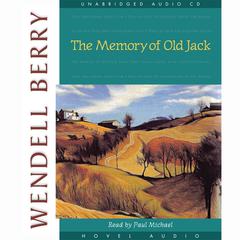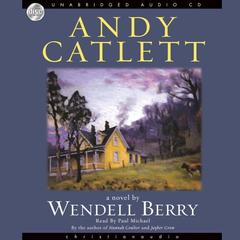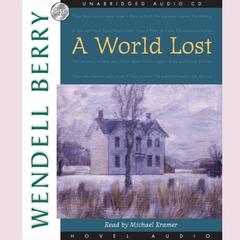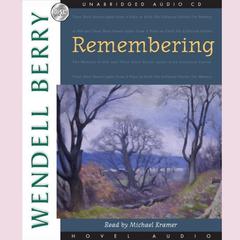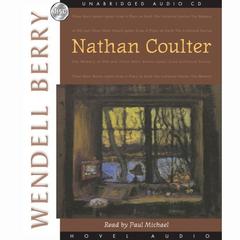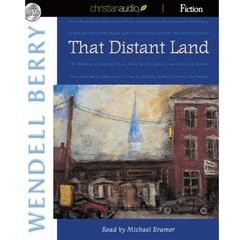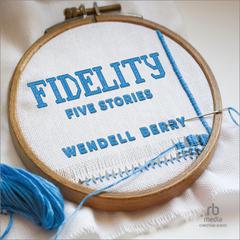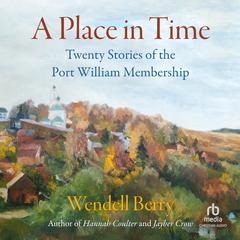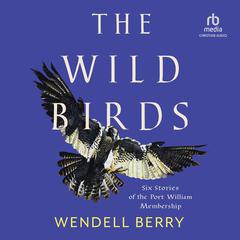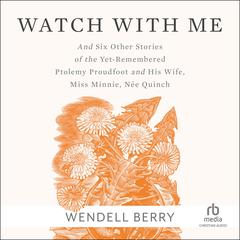 Play Audiobook Sample
Play Audiobook Sample
Hannah Coulter: A Novel Audiobook
 Play Audiobook Sample
Play Audiobook Sample
Quick Stats About this Audiobook
Total Audiobook Chapters:
Longest Chapter Length:
Shortest Chapter Length:
Average Chapter Length:
Audiobooks by this Author:
Publisher Description
In the latest installment in Wendell Berry's long story about the citizens of Port William, Kentucky, readers learn of the Coulters' children, of the Feltners and Branches, and how survivors "live right on." "Ignorant boys, killing each other,” is just about all Nathan Coulter would tell his wife about the Battle of Okinawa in the spring of 1945. Life carried on for the community of Port William, Kentucky, as some boys returned from the war while the lives of others were mourned. In her seventies, Nathan’s wife, Hannah, now has time to tell of the years since the war.
Download and start listening now!
"Normally I would not be drawn to a book like this. But from reading the back cover (the blurbs were actually surprisingly substantive in this case) and the first few pages, it seemed to share many similarities with a book I read earlier this year and loved, The Book of Ebenezer Le Page. So I started reading this as if it were The Book of Hannah Coulter. And my initial suspicion was correct, there were many similarities. Both are told from the perspective of an older person who has lived off the same land all their lives. Both were addressed to someone whom we find out only towards the tail end of the book. Both concerned themselves with tradition and the plight of tradition in the modern world. Both talked about what it felt like to be left behind. Both recounted war's effects on the community. Both had me teary eyed.You think you will never forget any of this, you will remember it always just the way it was. But you can't remember it the way it was. To know it, you have to be living in the presence of it right as it is happening. It can return only by surprise. p. 148What really worked in this book was how simple it was. How simply told. And how little it concerned itself with the details. As opposed to Ebenezer's endless tall tales, where story after story built up into a mosaic of life with a rich fiber to it, here we are given only generalities. Always Hannah's old voice, her wisdom which spoke to all things, came around to comment on things in broad strokes. That's hard to pull off. But Wendell Berry pulls it off here--mostly. It's not supposed to work, but it does because the prose itself seems honest. He doesn't have any literary tricks up his sleeve, and his protagonist speaks plainly, though beautifully also. There's an open quality here, and no feeling that we are reading a novel--For example: it manages to go 190 pages without any conflict or tension, save very minor ones, and maybe "modern life" towards the middle. But it's all done with this peaceful meditative rhythm to the sentences, so that it never seems to oppose anything, just accept accept accept. And though I feel the book did have an agenda, it was a well-earned one that grew out of the lives of its characters (that agenda being the idea that we must know intimately the people and place we came from, and tend to that place). The big idea of education, from first to last, is the idea of a better place. Not a better place where you are, because you want it to be better and have been to school and learned to make it better, but a better place somewhere else. In order to move up, you have got to move on. I didn't see this at first. And for a while after I knew it, I pretended I didn't. I didn't want it to be true. p. 112Well, there is one exception, and that is my complaint with the book. The Okinawa chapter didn't sit well with me, I couldn't hear Hannah's voice saying those things. It seemed too much like the author trying to insert his anti-war message in there, and it muddled up the simplicity of the story. But even in that chapter there were good parts. If I were his editor I would suggest changing the "you" 2nd person voice in those passages to be less direct... maybe a series of "I read about..."s from Hannah. And definitely cut that section a little shorter, without so much imagery. Then, maybe, just maybe it will work.Living without expectations is hard but, when you can do it, good. Living without hope is harder, and that is bad. You have got to have hope, and you mustn't shirk it. Love, after all, "hopeth all things." But maybe you must learn, and it is hard learning, not to hope out loud, especially for other people. You must not let your hope turn into expectation. p 146Two more things. One: this book had very little humor in it, though there is a light-heartedness to some sections.Two: show don't tell is a bit of writing advice that it ignores completely... and for good reason, it's a stupid bit of advice that only works for business majors taking creative writing classes. Great writers often tell, but the key is to tell well, which is difficult to teach (which is why they avoid it by saying don't tell). About 90% of this book is telling, and reflecting, and it works.OK, three: Out of the 163 books I've read by male authors -- granted not all are novels -- only two were written completely in the voice of a female narrator: this one and Wittgenstein’s Mistress (which itself wasn't that convincing as a particularly female voice). Others dip in and out of it like As I Lay Dying and the last chapter of Ulysses, but don't stick with that voice throughout. And there are those where it is not clear whether the speaker is male or female like How I Became a Nun. But it got me thinking about how rare this is. And for female writers writing in the voice of a male? 0 out of the 98 in my bookshelves, unless I mis-remembered some."
— Jimmy (4 out of 5 stars)
Quotes
-
“Susan Denaker brings twice-widowed farm wife Hannah to life with soft-spoken but resolute dignity…She adjusts the octave and tone of the male and female characters of varying ages just enough to set them apart from each another, but listeners can be certain that Hannah maintains full control of her own storytelling. The experience evokes a sublime visit to a beloved grandmother figure with memories and wisdom to impart.”
— Publishers Weekly -
“[A]n impassioned, literary vision of American rural life and values.”
— Publishers Weekly
Hannah Coulter Listener Reviews
-
" This was my second time reading this book, and I loved even more this time around! I would probably give it more like a 4 1/2. "
— Adilee, 2/19/2014 -
" Elderly Kentucky woman tells story of her life. Warm, earthy, full of good feelings and good people. Easy read, lyrical at times, sometimes like an essay. "
— Jim, 2/17/2014 -
" An excellent novel! I was amazed that a man could write such a deep and profound female character. There are many gems and insights into life as Hannah, an old woman, looks back and recounts her journey. "
— Olive, 2/9/2014 -
" I am LOVING this book... "
— Erin, 1/26/2014 -
" An enjoyable journey through post-war, rural America. It wasn't melodramatic or theatrical. Just a steady read. Well written. "
— Edie, 1/25/2014 -
" Wow. This book is a gift. I first heard about Wendell Berry in college when we were studying nature writers and I think we read some of his poetry. But I haven't really thought of him since then, yet I am so glad I picked this up. I loved this novel. It's about a small farming community and covers the life of one woman in that community. The way people are in this book and their values feel so familiar to me, and I don't find many books like that. And although there is much about this that feels old fashioned and familiar, there's something revolutionary about it too. Made me feel the way I felt the first time I read Thoreau, reminding me to question my assumptions and to really ask myself who I am, what it is that I want for my life, and not to be afraid to march to the beat of a different drummer. I just don't find books like this everyday, something with so much wisdom. A lot of reviews I read call Wendell Berry a prophet and I can see why, having read this, he's almost in a class of his own. And, after reading a lot of post modern stuff, which sometimes seems empty, he makes me feel like there is still hope. Now more than ever I need to read books that give me hope. I have to put in some quotes from the book about married love that made me weep (literally) for their profound beauty and truth. "Watching him and watching myself in my memory now, I know again what I knew before, but now I know more than that. Now I know what we were trying to stand for, and what I believe we did stand for: the possibility that among the world's wars and sufferings two people could love each other for a long time, until death and beyond, and could make a place for each other that would be a part of their love, as their love for each other would be a way of loving their place. This love would be one of the acts of the greater love that holds and cherishes all the world." "We were looking at each other, though we could barely see. It was almost dark. But to know you love somebody, and to feel his desire falling over you like a warm rain, touching you everywhere, is to have a kind of light. When a woman and a man give themselves to each other, they have a light between them that nobody but them can see. It doesn't shine outward into time. They see only each other and what is between them." "What I was always reaching toward in him was his gentleness that had been made in him by loss and grief and suffering, a gentleness opposite to the war that he wasn't going to talk about, and never did, but that I know at least something about, having learned it since he died. The gentleness I knew in him seemed to be calling out, and it was a gentleness in me that answered. That gentleness, calling and answering, giving and taking, brought us together. It brought us into the room of love. It made our place clear around us." "The rhymes came. But you may have a long journey to travel to meet somebody in the innermost inwardness and sweetness of that room. You can't get there just by wanting to, or just because the night falls. The meeting is prepared in the long day, in the work of years, in the keeping of faith, in kindness. The room of love is another world. You go there wearing no watch, watching no clock. It is the world without end, so small that two people can hold it in their arms, and yet it is bigger than worlds on worlds, for it contains the longing of all things to be together, and to be at rest together. You come together to the day's end, weary and sore, troubled and afraid. You take it all into your arms, it goes away, and there you are where giving and taking are the same, and you live a little while entirely in a gift. The words have all been said, all permissions given, and you are free in the place that is the two of you together. What could be more heavenly than to have desire and satisfaction in the same room?" ON MEDITATION: "I sit and let the quiet come to me. It doesn't come right away. I have to quiet myself before I can hear the quiet of the place, and a car passing along the road up on the hillside or an airplane flying over makes it harder. But I listen and wait, and at last it comes. It is an old quiet, only deepened by the sound of the creek, a bird singing, or a barking squirrel. It goes back to the beginning..." "
— Callie, 1/25/2014 -
" So beautifully written and insightful, a little slow but worth it. "
— Maggie, 1/23/2014 -
" it had its slow moments, but i would definitely recommend it. wendell berry is an author with the power to make words flow and move like water. beautiful. <3 "
— Jessica, 1/21/2014 -
" A good book but a bit slow and sort of skipped around too much for me..... "
— Jenny, 12/31/2013 -
" This book is a wonderful story of a generation on its way out. Although the setting is in a rural, farming community, it speaks to anyone who considers themselves part of a community. It is a wonderful, quick read with lots to talk about afterwards. "
— Lizzie, 12/24/2013 -
" I loved this book, or more accurately, I loved Hannah Coulter herself. Such a charming personality this author has created. I was sucked into the descriptions of a simpler life and a simpler time. I feel like I understand my grandparents a little better for having read it. "
— Trenare, 10/10/2013 -
" I thought it was really slow. I got half-way through and was too bored to finish. "
— Joan, 5/21/2013 -
" Captures the rhythm of life; I felt like I was sitting on the front porch and soaking in the wisdom of a wise grandmother. "
— Jessica, 3/5/2013 -
" Wendell Berry writes with such depth and eloquence, weaving rich and poignant inter-generational tales of the citizens populating his fictional community of Port William, KY. Berry generates a sense of place more elegantly than any other author I know. Hannah Coulter is one of his best. "
— Hope, 1/13/2013 -
" My first Wendell Berry book and still my favorite so far. "
— Matthew, 1/6/2013 -
" One of the most beautifully written books I have ever read. "
— Annie, 12/6/2012 -
" This book did what books are supposed to do - speak to your soul. I am Hannah Coulter. Hannah Coulter is me. Who knew? So many things well-said will stay with me for a long time; someone outside of me wrote my thoughts and feelings about our world. "
— Jan, 9/4/2012 -
" I was prepared to dislike this book, but was pleasantly surprised. I was surprised to find that a man could write with such sensitivity from a woman's perspective. "
— Diane, 3/23/2012 -
" His short stories are better. "
— Jason, 1/22/2012 -
" great book - great language, great character... Hannah is a woman we can all identify with in some ways.... glad I read it. "
— Lavelle, 5/25/2011 -
" What a good read. This book is not plot-driven, but it's one of the best written, most observant books I've read in a long time. "
— Brent, 5/18/2011 -
" Amazing. I wanted to go there and stay. "
— Lzarr, 5/14/2011 -
" I think this will be my favorite read of 2011. It is beautifully written and Berry really captures the inner-workings of a marriage. I wanted to underline passages- which I usually have little desire to do! "
— Phoebe, 5/8/2011 -
" A great book to read - especially while visiting my son's farm in Indiana. Made me wish I would retire and go to work with him on the farm. However, don't read this book if you only like good endings. "
— Dana, 5/3/2011 -
" Hannah is in her 80's and looking back on her life. Raised primarily by her grandmother who then pushed her into the world where she then met and married two men and had three children. This book is a memoir of that life. Really enjoyed it! "
— lynn, 4/13/2011 -
" This book will be added to my favorites' list. It is not a big page turner but it is all about life and how one women learned how to live fully and love each day of her life. It touched my heart and made me think of my own life and how I have handled the different stages I have gone through. "
— Sharae, 4/2/2011 -
" This is my new favorite book. honestly. so simply written and yet so profound, from the perspective of an old woman letting go of the world and looking back on her simple life, this book was absolutely beautiful. "
— Jennifer, 3/31/2011 -
" Looking forward to reading more by this author. "
— Siah, 3/30/2011 -
" I loved this book. and it resonates with me. Not a book to read in a hurry, but to take your time and enjoy it. "
— Ruth, 3/18/2011 -
" One of the best books I've ever read. "
— Ruby, 3/14/2011 -
" It was pretty good. Slow in some spots, but a lot of nuggets of wisdom. "
— Joanna, 3/1/2011 -
" I loved the simple language of the narrator Hannah. It feels like a cross between memoir and a devotion. I long to breath her air, walk in her fields, and know her rural Kentucky small town and it's people. "
— Pam, 2/28/2011 -
" I want more gentle novels like this. "
— Amy, 2/26/2011
About Wendell Berry
Wendell Berry was born in Henry County, Kentucky, in 1934, and lives and farms with his wife, Tanya Berry, close to the place of his birth. A poet, critic, storyteller, and activist, he has written more than fifty books. He is the recipient of The National Humanities Medal, awarded by President Barack Obama, and was named The Jefferson Lecturer for 2012. He is a winner of the Richard C. Holbrooke Distinguished Achievement Award, and is a Fellow of the American Academy of Arts and Sciences.
About Susan Denaker
Susan Denaker is an actress and Earphones Award–winning narrator. Her extensive theater credits include numerous plays in the West End of London, national tours, many English rep companies, including a season with Alan Ayckbourn’s company in Scarborough. In the US, she has appeared in Our Town and Sweet Bird of Youth at the La Jolla Playhouse and Breaking Legs at the Westport Playhouse.




